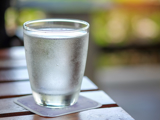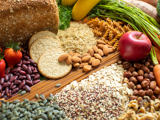Many nutrients can affect the condition of our skin, nails and hair. But we can get all of these from a healthy, balanced diet. This will include plenty of fruit and vegetables, wholegrains, some good quality sources of protein like pulses, and fish, eggs and lean meat (if you're not vegan), some dairy or dairy alternatives (such as soya drinks) and some healthy fats (these can include nuts and seeds, oily fish, unsaturated oils like olive/rapeseed oil and avocados).
It is also good to drink plenty of fluids to help keep skin hydrated (at least 6 to 8 glasses a day) – water is an excellent choice. You may see many nutrition supplements that claim to make your hair shinier or skin glow, but we do not have enough evidence to support their benefits, particularly if you are eating a healthy diet. If you are concerned about a skin condition or hair loss, then it’s best to get this checked out by your GP.











